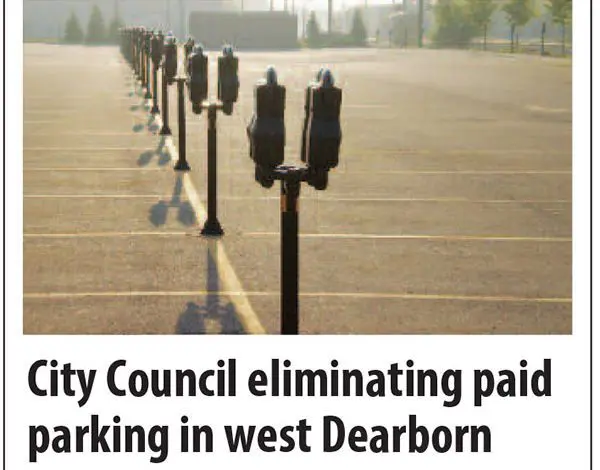
DEARBORN — On Tuesday, October 21, Dearborn’s city council passed a resolution that authorized the elimination of paid parking in West Dearborn after years of persistence from local business owners and residents who were claiming the system had a negative economic impact on the city.
The move is expected to go into effect beginning in January. The city’s plan will be to eliminate paid parking from the two parking decks located between Terry Street and Howard Street off of Michigan Ave. Those decks are usually used by customers of Kabuki Sushi, Famous Hamburger, Moose Martini, iBurger and Le Cigar, among others.
In addition, the paid parking system will also be eliminated in other areas of west Dearborn. The parking lot that houses the Panera Bread and Buffalo Wild Wings, north of Michigan Avenue will also see paid parking expunged.
Earlier this year, Mayor Jack O’Reilly told The Arab American News that the city’s next goal for the area would be to decommission paid parking altogether, by assessing property values to subsidize the maintenance for those parking lots and putting it under the fiscal responsibility of the West Dearborn Downtown Development Authority.
According to Mary Laundroche, the director of the Department of Public Information, the city will also pay for a portion of maintaining the parking lots through the city’s general fund. There will also be an implementation of a special assessment district.
“There’s been a perception that paid parking was an obstacle to redevelopment and that’s why it’s being decommissioned,” Laundroche told The Arab American News. “There is discussion about keeping parking meters on the streets, near the spots that are the most convenient to the business districts.”
The parking meters that the city will continue to operate include those on Howard (West Village Dr. to Garrison), Mason (West Village Dr. to Michigan Ave.) and West Village Dr. (Mason to Howard). Those parking meters will be enforced with short term 1-2 hour parking.
The city has long argued that paid parking systems were common in vibrant downtown districts, such as Royal Oak, Birmingham and Wyandotte, which have had success using similar systems.
While some will look at the removal of paid parking as a step in the right direction, others still feel there is a long road ahead for the area. Vacant buildings still occupy a small portion of the business district, as many of them had been owned by a dormant business owner. The city said they recently settled a suit in court, and as a result, it expects to see major traction in those spots in coming years.
While business owners in west Dearborn had never been keen on the idea of paid parking, they had an advantage over others in the city. Businesses in east Dearborn, for example, were responsible for paying and maintaining their own parking lots. O’Reilly believed this gave an advantage to businesses in west Dearborn.
Dearborn City Council President Susan Dabaja said that paid parking had often been a subject of concern when she received feedback from residents. She said the city council, along with the Mayor’s office, worked hard to execute the plan this year.
“Paid parking has been a sensitive topic for quite some time. A lot of discussion and thought went into determining what is the best possible resolution for this matter and at the end the decision was made to eliminate paid parking,” Dabaja said. “We hope that this will generate economic activity and new interest throughout west Dearborn. I want to applaud the administration, the parking advisory committee and the City Council for their hard work. I truly hope that this will be a success for our city.”






Leave a Reply